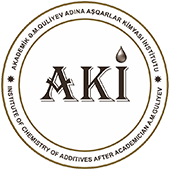Interview
At the COP29 conference, which will be held in Baku this November, it is planned to discuss issues such as achieving progress in this area by limiting the amount of carbon dioxide in the world to 1.5 degrees Celsius, as in the previous industrial age, making new commitments to participating countries and ending the climate crisis. At the same time, by a corresponding decree of Azerbaijani President Ilham Aliyev, 2024 was declared the “Green World Solidarity Year” in the country. All this is a clear example of how much attention is paid to solving global environmental problems and ensuring environmental safety in the republic.
The Cabinet of Ministers is preparing and implementing a plan for various measures to ensure the environmental safety of our country. Research institutions, including Academician Ali Guliyev Institute of Chemistry of Additives of the Ministry of Science and Education, play an active role in the timely and prompt implementation of the priorities provided for in these plans. In this regard, we addressed several questions to the executive director of the institute, Professor Afsun Sujayev.
– How do you assess the importance of COP29 as a chemical scientist closely familiar with this area?
– As you mentioned, in November this year our capital will host the 29th session of the Conference of the Parties to the UN Framework Convention on Climate Change. It is a fact that COP29 cannot be compared to the events held in our country so far. Even to this day, if we remember the European Games, one of the large-format events held in Baku, then 5 thousand athletes and about 3 thousand guests accompanying them came to our republic. However, it is expected that 70-80 thousand foreign representatives will arrive in our country at COP29.
Therefore, to hold this prestigious event worthy of the name of the victorious country, everyone must be mobilized, from ordinary citizens to authorized persons, from government agencies to private organizations, regardless of nationality, language and religion, and everyone must fulfill their duties at a high level. Our scientists realize the importance of this event and understand the responsibility of the conference.
– What work have scientists at the Institute of Chemistry of Additives already done and will do in the future to solve global environmental problems and ensure environmental safety, which are among the main goals of COP29?
– Since our republic is a rich oil and gas country, oil and gas production, oil and gas refining, petrochemicals and the chemical industry as a whole have always required special attention to environmental issues. However, during the Soviet period, the leadership of the former USSR produced oil in this field based on completely useless technologies and pursued a policy of complete extraction and depletion of the “black gold” that Azerbaijan possesses. This deliberate policy has not only depleted our underground wealth, but has also damaged our country’s ecological environment, created an environmental crisis in oil-polluted areas, and seriously jeopardized human health.
After national leader Heydar Aliyev came to power, thanks to the determination and will of a genius, a major turnaround began in the direction of solving environmental problems with the reconstruction and modernization of the oil and gas sector and the chemical industry of Azerbaijan.
Regarding your question, I would like to note that the fundamental and applied work of scientists at the Institute of Chemistry of Additives, aimed at solving environmental problems, can be divided into several groups. You know very well that the main part of petroleum products is motor and heating fuel. When these fuels are burned in engines, hydroelectric power plants, and industrial plants, toxic gases such as carbon dioxide, carbon monoxide, light hydrocarbons, sulfur and nitrogen oxides are released into the atmosphere.
When any engine operates primarily on diesel fuel, in addition to the listed gases, soot particles and significant amounts of carcinogenic compounds and derivatives of aromatic compounds (benzopyrene, etc.) are released into the atmosphere. Currently, most countries in the world have emission criteria for diesel engines for a number of pollutants. According to research from the Institute of Lung Health at the University of Leicester in the UK and medical centers in other countries, soot particles from transport engines accumulate in the lungs of people, especially young children, and lead to serious complications.
To solve this global problem, our institute has created an effective anti-smoke additive for diesel fuels, which allows reducing air pollution by smoke, which is the main toxic component of diesel exhaust gases. Thus, the first anti-smoke additive for diesel fuel was created and used not only in our country, but also in the territory of the former USSR, sharply reducing the amount of smoke and carcinogenic substances in the gases released during the operation of diesel engines.
This additive is made from accessible and cheap raw materials. The process of its production was quite simple in terms of technological and technical design and could easily be implemented on an industrial scale. This anti-smoke additive, added to the fuel in a concentration of 0.2-0.5 percent by weight, depending on the type of diesel engine, ensured a reduction in smoke emitted by it by 60-90 percent.
Running a diesel engine on fuel containing anti-smoke additives can significantly reduce waste emissions into the atmosphere compared to international sanitary standards.
Research conducted at F.Fersman Institute of Experimental and Clinical Oncology of the Academy of Medical Sciences of the Russian Federation showed that adding the anti-smoke additive to diesel fuel, developed at the Institute of Chemistry of Additives, can reduce the amount of carcinogenic substances in exhaust gases by 45-50 percent.
This additive does not have a negative effect on the reliability and durability of diesel engines and fuel equipment, does not impair the filtering ability of diesel fuel at low temperatures, is a low-toxic substance and does not increase its toxicity when added to diesel fuel.
The anti-smoke additive developed at our institute was successfully tested in diesel engines of various equipment not only in our country, but also in leading scientific centers and factories in many republics of the former USSR, and positive results were obtained.
The anti-smoke additive for diesel fuel developed at the Institute of Chemistry of Additives is successfully used on large dump trucks from the quarries of the Kursk Magnetic Anomaly of the Russian Federation, boats of the Moscow shipping enterprise “Moscow River” and other organizations.
The use of this anti-smoke additive is especially effective when operating powerful diesel equipment in mines, quarries and other enterprises where work has to be stopped due to excessive exhaust gas poisoning, and is patented by the Russian Federation and Azerbaijan.
– What scientific works of yours have served to improve the environment in recent years?
– One of the scientific projects in which the institute’s scientists made a great contribution to the environmental safety of our country was associated with the creation of technology for the regeneration of used motor oils and the creation of lubricant compositions for various purposes based on the regeneration product.
The rapid expansion of the fleet of cars and other equipment in our country every year and the disposal of used lubricants cause environmental stress, polluting the environment. Therefore, one of the main tasks facing modern petrochemical science has long been to minimize this damage. From this point of view, in order to minimize the burden on the environment, it was necessary to improve the quality of lubricating oils using special additives, increase their service life, and also reuse used oils. To this end, several years ago, the institute conducted scientific research in the direction of reusing waste lubricating oils that create an environmental burden, and developed a new regeneration method – a technological process that ensures the reuse of used oils. Based on the obtained products, an analogue of commercial oil with additives was created and it was found that the regenerated oils can be used as a base oil in the creation of motor oils for various purposes.
For information, I also note that the “Pilot Plant” was built within the framework of the scientific project “Creation of technology for the regeneration of used oils using local bentonites and the processing of lubricants based on reclaimed oil”, carried out in 2014-2015 at the institute. Used lubricating oils provided by Azerenerji were regenerated. Since this is a new scientific approach, the research work was patented under the heading “secret”.
I would also like to inform you that as a result of oil pollution on the territory of the republic, the process of degradation of fertile soils occurs, their biological activity decreases, and the process of erosion intensifies. “Phytoremediation,” based on the use of the combined metabolic potential of microorganisms and plants, occupies a special place among biological methods that are economically and environmentally effective in cleaning up oil pollution. Taking this factor into account, the institute has developed a rational phytoremediation technology that takes into account the ecological and climatic conditions of Azerbaijan and ensures the joint effect of plants and destructive microorganisms for the restoration and fertilization of oil-contaminated soils.
One of the latest successful applied scientific works of the institute’s scientists aimed at solving environmental problems is related to the creation of a processing process and the use of the processed product “acid resin”, accumulated in the Balakhani region by thousands of tons and creating environmental problems.
Of course, more attention will be paid to these issues, and multifaceted activities will expand. Because COP29, which will take place in our country, will pose new challenges for our research institutes, as well as for our chemical scientists. Solving these problems will bring economic development to our republic, as well as environmental safety, which will become an example for other countries.
Punhan Efendiyev XQ


